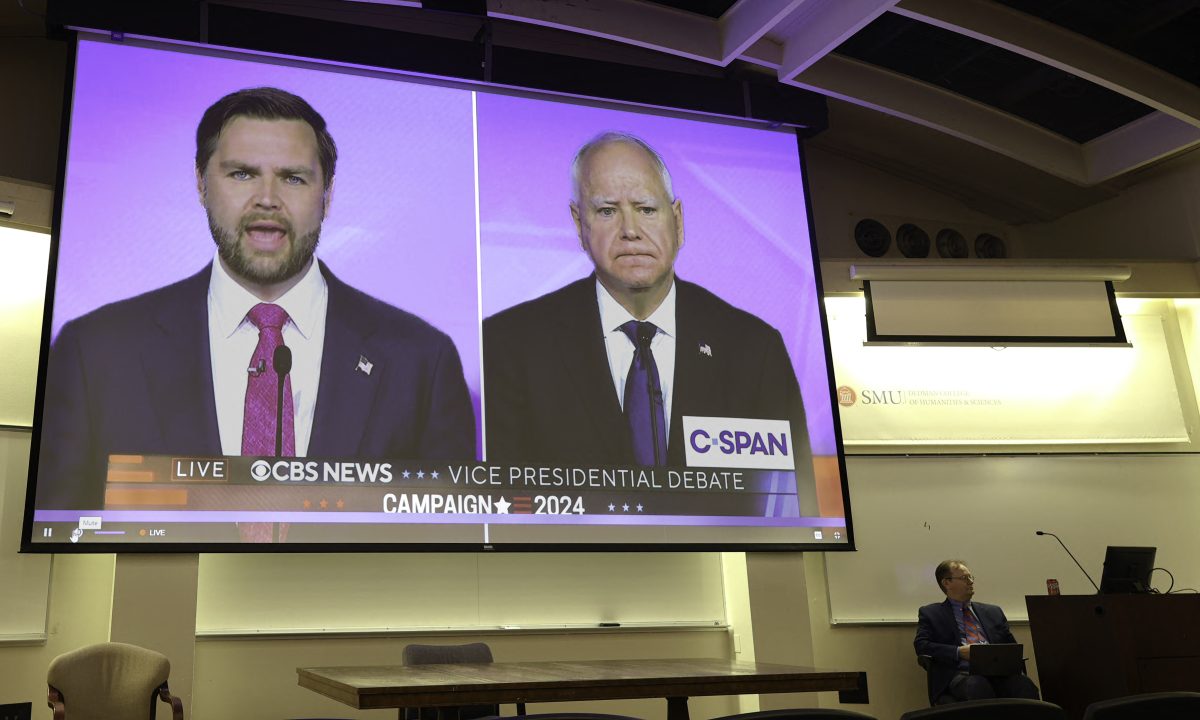Models decked out in the season’s hottest trends weaved in and out of caterers, who were whisking around champagne. Music from a DJ floated through racks of couture as sales associates waited anxiously to assist anyone with anything.
It was Fashion’s Night Out in Dallas, the first-ever worldwide shopping event sponsored by Vogue. From New York to Dallas and from London to Beijing, retailers joined together to host a one-of-a-kind global celebration of fashion. Department stores, luxury retailers, local boutiques and chains alike stayed open late hosting a bevy of promotions in an effort to revive the retail industry.
The evening of Sept. 10 was an event intended to entice shopaholics to spend again. But although it was not completely desolate, Dallas fashionistas definitely did not come out in droves. The recession, it seems, has taken its toll.
“I know Dallas fashion is not New York fashion, but there are a lot less people here than I expected,” SMU junior Caroline Young said, as she flipped through a rack of fall 2009 Diane Von Furstenberg at Neiman Marcus NorthPark, one of the night’s participating stores.
Smaller crowds are not surprising. Around the country luxury retailers are suffering. In Dallas, the once booming fashion industry is slowing considerably and high-end stores like Neiman Marcus are scrambling to get people shopping.
NorthPark’s bi-annual runway event, Fashion at the Park, was called off last spring and will not be held this fall. LFT, the mega-hyped-up trendy 17,000 square foot “Life Fashion Terminal” in Victory Park, closed its doors in early 2009, after opening in March 2007.
Retail marketing expert and SMU Cox School of Business professor Ed Fox said that Americans are not shopping because they have less disposable income for luxury goods, especially fashion.
“People have shifted their expenditures toward items that are more necessary than discretionary,” Fox said.
Among high-end retailers, Neiman Marcus has fared the worst this year, with a net loss of $168.5 million in its fourth quarter that ended Aug. 1, compared to its loss of $35.6 million a year ago. Saks posted a second quarter loss of $54.5 million on Aug. 18, compared to a 2008 second quarter loss of $32.7 million. While Nordstrom had a second quarter profit of $105 million, it was still down significantly from its profit of $143 million a year ago.
Nordstrom spokesman Colin Johnson said the company is seeing the same economic affects in its three Dallas stores as in its 109 other locations nationwide.
“What we have seen in Dallas is not inconsistent with what we have seen in other places,” Johnson said.
Dallas’ economic problems could be a result of over-expansion. Dallas boasts more shopping centers per capita than any other city nationwide. Fox said that although Dallas is one of the most thriving metropolitan areas, the city’s abundance of retail space is causing high levels of competition.
“We have a glut of retail space here,” Fox said. “Some of that retail space has been built out in anticipation for growth.”
Luxury retailers said their biggest goal in this economy is to just get customers inside the door.
“Even if customers aren’t looking to buy, we still want them to come see us,” Johnson said. “It’s a great chance to learn about different brands and trends or to just come into the store for lunch even.”
President and CEO of Neiman Marcus Stores Karen Katz has the same plan of action.
“The customer has to have a reason to come into the store and relax, have a drink, look around at the fall merchandise and feel no pressure,” Katz said.
“Many people, while they could still afford items at Neiman Marcus or other luxury retailers, are not buying right now, and are certainly not buying in the volume that they bought before,” Fox said. “They are making fewer trips and on each trip they are buying less.”
Many Americans feel guilty spending money on luxury goods in a poor economy. For that reason, retailers like Neiman Marcus are aiming to alleviate buyer’s remorse.
“The idea is to make people not feel guilty about shopping, and that’s the way we are approaching the fall season in general,” Katz said.
Fox explains why Americans aren’t shopping by breaking luxury customers into two categories: core customers and aspirational customers.
According to Fox, core customers represent the most substantial amount of business. These customers purchase the most merchandise and shop the most frequently.
“They’re really the ones who are buying less and these retailers are really suffering,” Fox said.
Fox said aspirational customers are those who have a smaller budget but still demand expensive designer brands.
“They want stuff from Neiman Marcus, or they only buy things from Saks,” Fox said.
“They may only buy a piece, and might buy it on markdown, but they like to go there to be like the people who shop there.”
Compared to the core customer, the aspirational customer still has the desire for luxury goods, just not the budget.
“Their psychology is a little bit different,” Fox said. “These people are a little more income restrained, but their aspiration hasn’t gone away.”
Luxury retailers are trying to cater to a wider spectrum of income levels by carrying fewer couture pieces and introducing more ready-to-wear garments at varying price points. As a result, merchandise and marketing strategies are changing with the times.
“A little while back it seemed like brands were the focus, now we are sensing the customer is looking for the trends, and they want the right trend at the right price,” Johnson said.
Katz wants Neiman Marcus customers to remember that fashion is fun.
“The idea is to promote shopping as fun and entertainment and to try to give a boost to the fall season,” Katz said.








